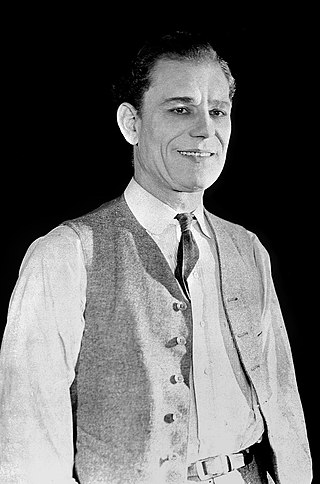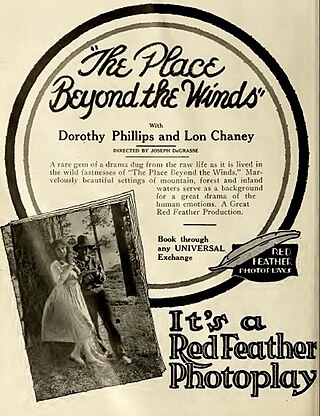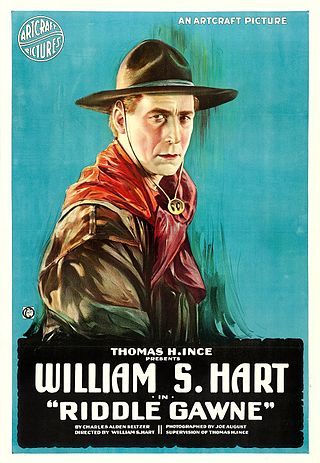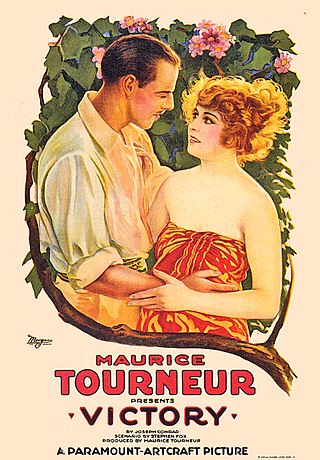
Leonidas Frank "Lon" Chaney was an American actor and makeup artist. He is regarded as one of the most versatile and powerful actors of cinema, renowned for his characterizations of tortured, often grotesque and afflicted, characters and for his groundbreaking artistry with makeup. Chaney was known for his starring roles in such silent horror films as The Hunchback of Notre Dame (1923) and The Phantom of the Opera (1925). His ability to transform himself using makeup techniques that he developed earned him the nickname "The Man of a Thousand Faces".

The Wicked Darling is a 1919 American silent crime film directed by Tod Browning, and starring Priscilla Dean, Wellington A. Playter and Lon Chaney as pickpocket "Stoop" Connors. This was the first time Lon Chaney appeared in a Tod Browning film, and many other collaborations between the two men would follow.

Back to Life is a 1913 American silent short drama film directed by Allan Dwan and featuring Pauline Bush, J. Warren Kerrigan, William Worthington and Lon Chaney. This was Chaney's first film with director Allan Dwan, which was followed by a dozen more. The film is now considered lost.

Red Margaret, Moonshiner is a 1913 American silent short romance film directed by Allan Dwan, starring Pauline Bush, Murdock MacQuarrie and Lon Chaney. This film, now considered lost, is a good example of Chaney's early attempts at creating bizarre makeups to enhance his roles, wearing a long beard and wild hair here as "Lon", the old moonshiner. The film's original working title was Warrington's Honor. Some sources say the film was later edited down to one reel and re-released in theaters as Moonshine Blood in 1916.

The Tragedy of Whispering Creek is a 1914 American silent short Western film directed by Allan Dwan and featuring Murdock MacQuarrie, Pauline Bush, and Lon Chaney. Chaney expert Jon Mirsalis says Chaney also wrote the screenplay, based on a story by Elliott J. Clawson, but the Blake book says the film's director Allan Dwan wrote the screenplay himself. A print exists in the Deutsche Kinemathek film archive, making it Chaney's earliest surviving moving picture. A still exists which shows Chaney in his role as "The Greaser".
The Forbidden Room is a 1914 American silent drama film directed by Allan Dwan and featuring Murdock MacQuarrie, Pauline Bush and Lon Chaney. The film's working title was originally The Web of Circumstance. The film is now considered to be lost.

By the Sun's Rays is a 1914 American short silent Western film directed by Charles Giblyn and featuring Lon Chaney and Murdock MacQuarrie. It is one of the earliest surviving films of Lon Chaney, with several prints existing in private film collections and a video release in 1995. A still from the film exists showing Lon Chaney in the role of the villainous "Frank Lawlor".
The Trust is a 1915 American short silent drama film directed by Lon Chaney and written by Katherine M. Kingsherry. It starred Lon Chaney and Vera Sisson. The film was also called The Truce in some magazine reviews. The film is today considered to be lost. A still exists showing Chaney as Jim Mason, hanging out in a bar with his criminal associates.

The Place Beyond the Winds is a 1916 American silent drama film directed by Joe De Grasse, and starring Lon Chaney, Gretchen Lederer and Dorothy Phillips. It was written by Ida May Park, based on the novel by Harriet T. Comstock. The director De Grasse also played a role in the film. The film's original working title was Mansion of Despair. A still exists showing Chaney in the role of Jerry Jo, the homeless man.
Accusing Evidence is a 1916 American silent Western film directed by Allan Dwan and starring Lon Chaney, Pauline Bush and Murdock MacQuarrie.

The Girl in the Checkered Coat is a 1917 American silent drama film directed by Joe De Grasse and starring Lon Chaney, Dorothy Phillips and William Stowell. It was written by Ida May Park, based on the short story by E. Magnus Ingleton. The film today is considered lost. A still exists showing Lon Chaney in the role of Hector Maitland.

A Doll's House is a 1917 American silent drama film based on the eponymous 1879 play by Henrik Ibsen. The film was written and directed by Joe De Grasse, and stars Lon Chaney, William Stowell and Dorothy Phillips. Film historian Jon C. Mirsalis stated that director De Grasse's wife Ida May Park wrote the screenplay, but most sources attribute both the writing and directing of the film to De Grasse himself. The film is today considered lost.

Fires of Rebellion is a 1917 American silent drama film written and directed by Ida May Park, and starring Lon Chaney, William Stowell, and Dorothy Phillips. The film is today considered lost. A still exists showing Lon Chaney in the role of the lecherous photographer Russell Hanlon. The film's main musical theme was Serenade by R. Czerwonky.

The Rescue is a 1917 American silent drama film written and directed by Ida May Park and starring Lon Chaney, William Stowell and Dorothy Phillips. The screenplay was based on a story by Hugh McNair Kahler. The film is today considered lost. A photo exists showing Lon Chaney in his role as Thomas Holland, a rare occasion when Chaney did not play a villain.

Riddle Gawne is a 1918 American silent Western film directed by William S. Hart and Lambert Hillyer, and featuring William S. Hart, Katherine MacDonald and Lon Chaney. The film was co-produced by William S. Hart and Thomas H. Ince. The screenplay was written by Charles Alden Seltzer from his earlier novel The Vengeance of Jefferson Gawne. Chaney historian Jon C. Mirsalis claims that William S. Hart contributed greatly to the screenplay but all other sources credit the writing of the screenplay solely to Charles Alden Seltzer.

That Devil, Bateese is a 1918 American silent action-drama film directed by William Wolbert and starring Monroe Salisbury, Ada Gleason, and Lon Chaney. The screenplay was written by Bernard McConville, based on a story written by Bess Meredyth. Even though this film was released before some of his earlier Universal films, it was actually Chaney's final film from his first stint at Universal Studios. Filming took place at Big Bear Lake and the San Bernardino National Forest in California. The film is considered lost.

Treasure Island is a 1920 silent film adaptation of the 1883 novel by Robert Louis Stevenson, directed by Maurice Tourneur, and released by Paramount Pictures. Lon Chaney played two different pirate roles in this production, "Blind Pew" and "Merry", and stills exist showing him in both makeups. Charles Ogle, who had played Frankenstein's Monster in the first filmed version of Frankenstein a decade earlier at Edison Studios, portrayed Long John Silver. Wallace Beery was supposed to play Israel Hands, but that role went to Joseph Singleton instead. The film was chosen as one of the Top Forty Pictures of the Year by the National Board of Review.

Victory is a surviving 1919 American action film directed by Maurice Tourneur and starring Jack Holt, Seena Owen, Lon Chaney, Wallace Beery and Bull Montana. The film is an adaptation of the 1915 eponymous novel by Joseph Conrad. The screenplay was written by Jules Furthman and Ben Carré was the art director.

When Bearcat Went Dry is a 1919 American silent drama film directed by Oliver L. Sellers from the novel by Charles Neville Buck, and starring Lon Chaney as Kindard Powers. The title refers to a character nicknamed "Bearcat" who promises his girlfriend that he will quit drinking liquor. The plot involving a promise to give up drinking was timely given the passage of the Wartime Prohibition Act, which took effect on June 30, 1919, and banned the sale of alcoholic beverages, and ratification of the Eighteenth Amendment to the United States Constitution in January of the same year.
Bondage is a 1917 American silent drama film written and directed by Ida May Park, and starring Dorothy Phillips, William Stowell, Gretchen Lederer and J.B. MacLaughlin.
















